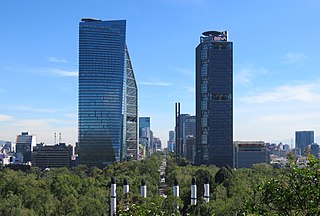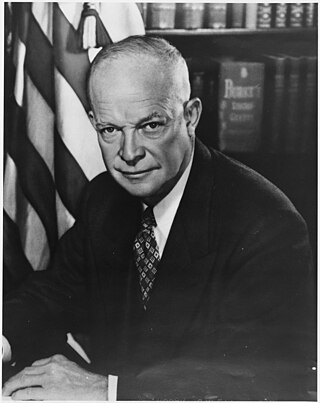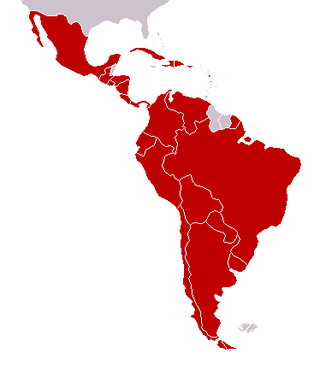
The economy of Mexico is a developing mixed-market economy. It is the 14th largest in the world in nominal GDP terms and the 13th largest by purchasing power parity according to the International Monetary Fund. Since the 1994 crisis, administrations have improved the country's macroeconomic fundamentals. Mexico was not significantly influenced by the 2002 South American crisis, and maintained positive, although low, rates of growth after a brief period of stagnation in 2001. However, Mexico was one of the Latin American nations most affected by the 2008 recession with its gross domestic product contracting by more than 6% in that year.

Guava is a common tropical fruit cultivated in many tropical and subtropical regions. The common guava Psidium guajava is a small tree in the myrtle family (Myrtaceae), native to Mexico, Central America, the Caribbean and northern South America. The name guava is also given to some other species in the genus Psidium such as strawberry guava and to the pineapple guava, Feijoa sellowiana. In 2019, 55 million tonnes of guavas were produced worldwide, led by India with 45% of the total. Botanically, guavas are berries.

The United States embargo against Cuba prevents U.S. businesses, and businesses organized under U.S. law or majority-owned by U.S. citizens, from conducting trade with Cuban interests. It is the most enduring trade embargo in modern history. The U.S. first imposed an embargo on the sale of arms to Cuba on March 14, 1958, during the Fulgencio Batista regime. Again on October 19, 1960, almost two years after the Cuban Revolution had led to the deposition of the Batista regime, the U.S. placed an embargo on exports to Cuba except for food and medicine after Cuba nationalized the US-owned Cuban oil refineries without compensation. On February 7, 1962, the embargo was extended to include almost all exports. The United Nations General Assembly has passed a resolution every year since 1992 demanding the end of the U.S. economic embargo on Cuba, with the U.S. and Israel being the only nations to consistently vote against the resolutions.

A tres leches cake, dulce de tres leches, also known as pan tres leches or simply tres leches, is a sponge cake—soaked in three kinds of milk: evaporated milk, condensed milk, and whole milk. The cake is popular throughout Latin America.
The Caribbean Basin Initiative (CBI), a trade initiative initiated by the 1983 Caribbean Basin Economic Recovery Act (CBERA), is a United States program. The CBI came into effect on January 1, 1984, and aimed to provide several tariff and trade benefits to many Central American and Caribbean countries. Provisions in the CBERA prevented the United States from extending preferences to CBI countries that it judged to be contrary to its interests or that had expropriated American property.

Slavery in the Spanish American colonies was an economic and social institution which existed throughout the Spanish Empire including Spain itself. In its American territories, early Spanish monarchs put forth laws against enslaving Indigenous peoples of the Americas. Queen Isabella outlawed the enslavement of Native Americans in the Spanish colonies of the New World because she viewed the natives as subjects of the Spanish monarchy. While Spain displayed an early abolitionist stance towards the Indigenous, some instances of illegal Native American slavery continued to be practiced by rogue individuals, particularly until the New Laws of 1543 which expressly prohibited it.

Amerijet International Airlines, Inc. is an American cargo airline headquartered in Miami, United States. The airline delivers air freight with its fleet of Boeing 757s and Boeing 767s from its main hub at the Miami International Airport to 48 destinations throughout the Caribbean, Mexico, Central and South America. Their network spans 476 destinations throughout the world, including Europe, Asia, the Americas, Africa, and the Middle East.
Seaboard Corporation is a diverse multinational agribusiness and transportation conglomerate with integrated operations in several industries. In the United States, the company mainly engages in pork production and processing and ocean transportation. Internationally, Seaboard is primarily engaged in commodity merchandising, grain processing, sugar production and electrical power generation. The parent company, Seaboard Corporation is based in the Kansas City suburb of Merriam, Kansas. Its subsidiaries include Seaboard Foods, Seaboard Marine, Seaboard Overseas & Trading Group (SOTG), Tabacal Agroindustria, Transcontinental Capital Corporation, Ltd. (TCCB), and Mount Dora Farms. It has 50% non-controlling interest in Butterball, LLC. Its principal operating divisions are pork, commodity trading and milling, marine, sugar, and power. More than 50% of the corporation is owned by members of its founding family, the Breskys.

Daína Chaviano is a Cuban-American writer of French and Asturian descent. She has lived in the United States since 1991.

The United States Commercial Service (CS) is the trade promotion arm of the U.S. Department of Commerce's International Trade Administration. CS is a part of the U.S. Foreign Service and its commercial officers are diplomats. The CS global network of trade professionals helps thousands of U.S. companies to export goods and services worth billions of dollars every year. CS trade specialists are located throughout the United States, as well as in U.S. embassies and consulates in over 75 countries around the world. The mission of CS is to advance and protect strategic U.S. commercial and economic interests around the world.
Latin American culture is the formal or informal expression of the people of Latin America and includes both high culture and popular culture, as well as religion and other customary practices. These are generally of Western origin, but have various degrees of Native American, African and Asian influence.

The Colón Free Trade Zone is a free port in Panama dedicated to re-exporting a wide variety of merchandise to Latin America and the Caribbean. It is located on the Caribbean coast, near the Atlantic entrance to the Panama Canal, in the province of Colón, within the city of Colón though outside its municipal jurisdiction and operates as an autonomous entity of Panama.
Latin Trade is a monthly magazine covering global business in Latin America and the Caribbean. Similar to Forbes and Fortune Magazine in coverage, the magazine was founded in 1993 and now publishes 40,000 copies every two months in Spanish and English. Some 90% of the magazine's circulation is in Latin America. The magazine has won 27 editorial and design awards since 2002, including awards from the Association of Business Publication Editors (ASBPE).

The economy of Belize is a small, essentially private enterprise economy that is based primarily on agriculture, tourism, and services. The cultivation of newly discovered oil in the town of Spanish Lookout has presented new prospects and problems for this developing nation. Belize's primary exports are citrus, sugar, and bananas. Belize's trade deficit has been growing, mostly as a result of low export prices for sugar and bananas.
LatinFinance is a source of intelligence on the financial markets and economies of Latin America and the Caribbean.
Amaury Rivera, the current Chairman and CEO of Kinetics Systems Caribe, set up the two earliest competitors to the dominant Puerto Rico Telephone Company when the U.S. territory's telecommunication's market was opened to competition in 1996.

Mexico–Suriname relations are the diplomatic relations between Mexico and Suriname. Both nations are members of the Association of Caribbean States, Community of Latin American and Caribbean States, Organization of American States and the United Nations.

Latin America as a region has multiple nation-states, with varying levels of economic complexity. The Latin American economy is an export-based economy consisting of individual countries in the geographical regions of North America, Central America, South America, and the Caribbean. The socioeconomic patterns of what is now called Latin America were set in the colonial era when the region was controlled by the Spanish and Portuguese empires. Up until independence in the early nineteenth century, colonial Latin American regional economies thrived and worked things out. Many parts of the region had favorable factor endowments of deposits of precious metals, mainly silver, or tropical climatic conditions and locations near coasts that allowed for the development of cane sugar plantations. In the nineteenth century following independence, many economies of Latin America declined. In the late nineteenth century, much of Latin America was integrated into the world economy as an exporter of commodities. Foreign capital investment, construction of infrastructure, such as railroads, growth in the labor sector with immigration from abroad, strengthening of institutions, and expansion of education aided industrial growth and economic expansion. A number of regions have thriving economies, but "poverty and inequality have been deeply rooted in Latin American societies since the early colonial era."












